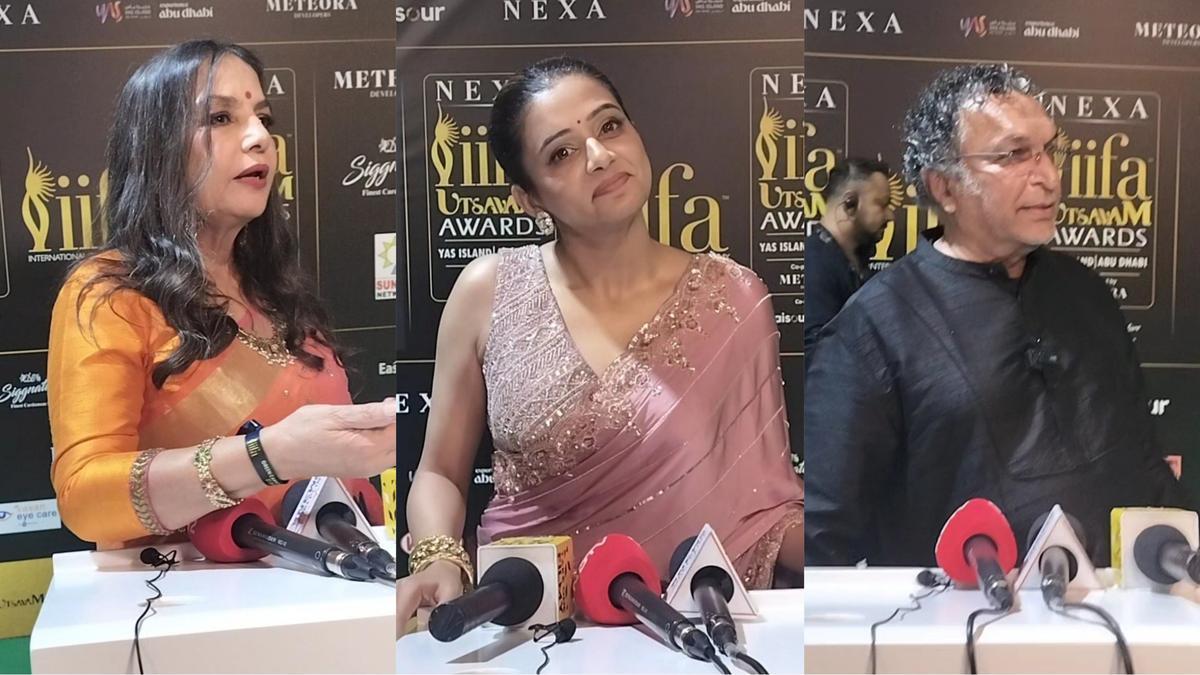
The green carpet ahead of the International Indian Film Academy (IIFA) Utsavam awards at the Etihad Arena in Abu Dhabi on September 27, 2024, was a realm not only of glitz and glamour. Many distinguished celebrities took a moment to address the pressing questions from the media, even as they dazzled in their stylish attires and posed for the cameras.
It’s been a little over a month since the Justice K Hema Committee report sent shockwaves through the Malayalam film industry, sparking dialogue across various film fraternities. The report has brought to light numerous issues related to women’s safety and the treatment of female actors, making it a significant topic of discussion.
Celebrated actress Shabana Azmi, who is marking her remarkable 50th year in cinema, candidly addressed the issues highlighted by the report. “As far as treating women with respect is concerned, the industry has miles to go,” Azmi remarked. “You need to understand that the journey of women in India spans across centuries. From the 16th century to the 21st, women have made progress yet have been suppressed simultaneously,” she added, pointing out that deep-seated patriarchy continues to prevent women from achieving their full potential.
Her comments were echoed by several other stalwarts in the industry. Meena, a seasoned actor with numerous successful Tamil and Malayalam films under her belt, offered her personal perspective on the matter. “People have shared their individual experiences. Luckily, I haven’t faced any negative incidents in the industry,” she said, reiterating her stance on the topic based on her personal experience.
However, not all celebrities were keen to delve into the issue. Known for his controversial statements and unconventional behavior during press conferences, Malayalam actor Shine Tom Chacko was visibly irritated by questions about the Hema Committee report. “You don’t discuss a death at a wedding ceremony. It’s common sense. I am not here to talk about that,” he curtly responded, refusing to engage further on the topic.
For multilingual actress Priyamani, ensuring safety on film sets remains a top priority.
. She emphasized the necessity of taking additional precautions to ensure a secure working environment. “Until very recently, either my mother or sister would accompany me to shoots. Their presence made me feel safe. If the film set cannot guarantee security, we must ensure someone from our family is with us,” she explained, underscoring the need for better safety measures for women in the industry.
Veteran actor Nasser also weighed in, advocating for a stringent code of conduct within the film industry. “When I started out, the focus was solely on the physical safety of the artists. Today, both physical and mental health are important. There should be strict regulations on how one should behave with women,” he stated, calling for more comprehensive measures to protect the well-being of female actors.
The conversations on the green carpet of IIFA 2024 underscored the ongoing challenges and discussions surrounding women’s safety and rights in the film industry. The varied perspectives reflect a broader sentiment: while some strides have been made, a lot remains to be done.
Shabana Azmi’s comments were particularly poignant, shedding light on the broader historical context of women’s struggles in India. Her words served as a powerful reminder of the enduring issues of patriarchy and gender inequality that continue to plague various sectors, including cinema.
Meena’s personal experiences highlight that while many have been fortunate enough to avoid negative experiences, the industry still harbors significant issues that need addressing. Shine Tom Chacko’s reluctance to discuss the Hema Committee report also emphasizes the discomfort and sensitivity of the topic, suggesting that more open and constructive conversations are needed.
The concerns raised by Priyamani and Nasser point towards essential changes that need to be implemented to ensure that the environment on film sets is both physically and mentally secure for all artists.
As the glitz of IIFA 2024 fades, the echoes of these critical discussions will hopefully resonate, leading to tangible changes within the industry. The call for a more respectful and secure environment for women in cinema cannot remain mere rhetoric but must translate into action that addresses the concerns raised by these prominent voices.












